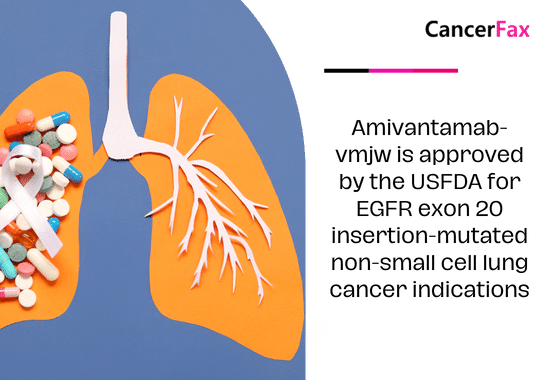The Food and Drug Administration approved amivantamab-vmjw (Rybrevant, Janssen Biotech, Inc.) in combination with carboplatin and pemetrexed on March 1, 2024. Patients with epidermal growth factor receptor (EGFR) exon 20 insertion mutations, identified by an FDA-approved test, are eligible for this treatment as the initial therapy for locally advanced or metastatic non-small cell lung cancer (NSCLC).
It was approved by the FDA to be used on adult patients with locally advanced or metastatic NSCLC who had EGFR exon 20 insertion mutations, which could be confirmed by an FDA-approved test, and whose condition got worse after platinum-based treatment. The FDA has already given rapid approval for this purpose.
The PAPILLON trial (NCT04538664) looked at how well it worked. It was a randomized, open-label, multicenter study with 308 patients who had EGFR exon 20 insertion mutations. Patients were randomly assigned in a 1:1 ratio to receive either amivantamab-vmjw with carboplatin and pemetrexed or carboplatin and pemetrexed.
The primary measure of effectiveness was progression-free survival (PFS) evaluated by blinded independent central review (BICR), with overall survival (OS) as an important secondary endpoint. A hazard ratio of 0.40 (95% CI: 0.30–0.53; p-value<0.0001) showed that amivantamab-vmjw plus carboplatin and pemetrexed significantly improved progression-free survival compared to carboplatin and pemetrexed alone. The median progression-free survival (PFS) was 11.4 months with a 95% confidence interval (CI) of 9.8 to 13.7 in one arm, and 6.7 months with a 95% CI of 5.6 to 7.3 in the other arm.
Although the overall survival statistics were not fully developed at the current analysis, with just 44% of the pre-specified fatalities reported for the final analysis, there was no indication of a negative trend.
The predominant side effects (≥20%) included rash, nail toxicity, stomatitis, infusion-related response, fatigue, edema, constipation, decreased appetite, nausea, COVID-19, diarrhea, and vomiting.
The patient’s body weight determines the recommended dosage of amivantamab-vmjw. Refer to the prescription instructions for precise dosage details.

Targeting FGFR4 and CD276 with CAR T-cells demonstrates a strong antitumor impact against children rhabdomyosarcoma
Chimeric antigen receptor (CAR) T-cells that specifically target Fibroblast Growth Factor Receptor 4 (FGFR4), a surface tyrosine receptor that is extensively expressed in rhabdomyosarcoma (RMS), are now undergoing clinical research. However, the effectiveness of these CAR T-cells may be hindered by tumor heterogeneity and inadequate activation. In this study, we present a method to enhance the co-stimulatory and targeting characteristics of a FGFR4 CAR through an optimization process. We substituted the hinge and transmembrane domain of CD8 as well as the 4-1BB co-stimulatory domain with the corresponding domains of CD28. The CARs produced exhibit heightened anti-tumor efficacy in multiple RMS xenograft models, with the exception of the RMS559 cell line, which is known for its aggressive nature.

